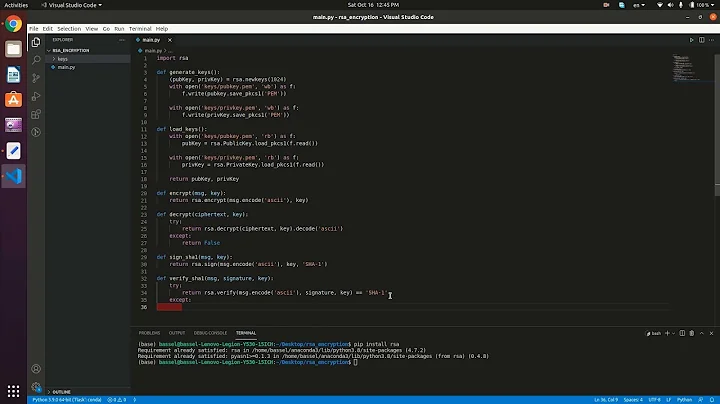Python Cryptography module save/load RSA keys to/from file
Your method of saving the private key throws away the newlines which load_pem_private_key() expects to see. I have modified your example slightly to illustrate this. The method save_key_bad() is your method, and the method save_key() shows a simple correct method.
from cryptography.hazmat.backends import default_backend
from cryptography.hazmat.primitives.asymmetric import rsa
from cryptography.hazmat.primitives import serialization
from cryptography.hazmat.primitives.serialization import load_pem_private_key
def gen_key():
private_key = rsa.generate_private_key(
public_exponent=65537, key_size=2048, backend=default_backend()
)
return private_key
def save_key(pk, filename):
pem = pk.private_bytes(
encoding=serialization.Encoding.PEM,
format=serialization.PrivateFormat.TraditionalOpenSSL,
encryption_algorithm=serialization.NoEncryption()
)
with open(filename, 'wb') as pem_out:
pem_out.write(pem)
def save_key_bad(pk, filename):
pem = pk.private_bytes(
encoding=serialization.Encoding.PEM,
format=serialization.PrivateFormat.TraditionalOpenSSL,
encryption_algorithm=serialization.NoEncryption()
)
pem_data = pem.splitlines()
with open(filename, 'wb') as pem_out:
for line in pem_data:
pem_out.write(line)
def load_key(filename):
with open(filename, 'rb') as pem_in:
pemlines = pem_in.read()
private_key = load_pem_private_key(pemlines, None, default_backend())
return private_key
if __name__ == '__main__':
pk = gen_key()
filename = 'privkey.pem'
save_key(pk, filename)
pk2 = load_key(filename)
save_key_bad(pk, filename)
pk3 = load_key(filename)
Related videos on Youtube
Comments
-
 Ludisposed almost 2 years
Ludisposed almost 2 yearsUsing the Cryptography module for Python,
I want to save my generated private key in a file, to use it later on.
But from the docs I was unable to find the method needed for this.
from cryptography.hazmat.backends import default_backend from cryptography.hazmat.primitives.asymmetric import rsa from cryptography.hazmat.primitives import serialization from cryptography.hazmat.primitives import hashes from cryptography.hazmat.primitives.asymmetric import padding # Working RSA encryption you can run for yourself MESSAGE = 'I am a very secret message' # Create private key private_key = rsa.generate_private_key( public_exponent=65537, key_size=2048, backend=default_backend() ) # Create public key public_key = private_key.public_key() # Encrypt ciphertext = public_key.encrypt( MESSAGE, padding.OAEP( mgf=padding.MGF1(algorithm=hashes.SHA1()), algorithm=hashes.SHA1(), label=None ) ) # Encrypted text print ciphertext # Decrypt plaintext = private_key.decrypt( ciphertext, padding.OAEP( mgf=padding.MGF1(algorithm=hashes.SHA1()), algorithm=hashes.SHA1(), label=None ) ) # Decrypted text print plaintext # Print human readable key pem = private_key.private_bytes( encoding=serialization.Encoding.PEM, format=serialization.PrivateFormat.TraditionalOpenSSL, encryption_algorithm=serialization.NoEncryption() ) pem_data = pem.splitlines() print pem_data # How to Save//LoadI know how to generate keys, but how can I save correctly to a file. By just storing the
pem_datain a file and later on loading from that file withload_pem_public_key?Since Cryptography is still new for me, I would like to know the correct way of storing RSA keys in a file.
This is my current try, but I get an error.
ValueError: Could not deserialize key data.if os.path.exists('key.pem'): print 'file exist' else: f = open(os.path.join(__location__, 'key.pem'), 'w') for i in pem_data: f.write(i) f.close() with open(os.path.join(__location__, 'key.pem'), "rb") as key_file: private_key = serialization.load_pem_private_key( key_file.read(), password=None, backend=default_backend() ) -
 President James K. Polk over 3 years@BenDavis: Please run the changed code before making an edit. The
President James K. Polk over 3 years@BenDavis: Please run the changed code before making an edit. Thepemlinesis already abytesobject, therefore there is nothing to encode. Thanks for reading the answer thoroughly and I'm always glad to have someone find my bugs or improve my answers.






